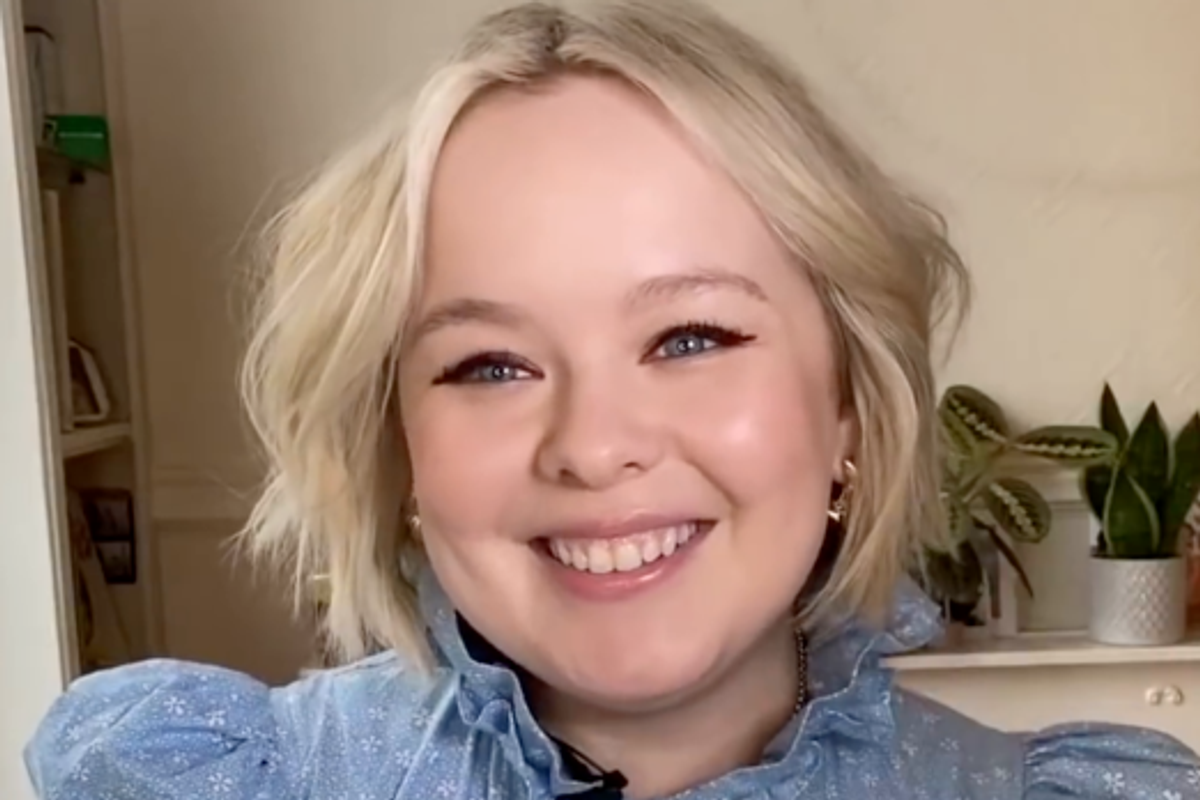'Bridgerton' star Nicola Coughlan's pleas for fans to stop commenting on her body
Many celebrities have been taking a stand on receiving fan commentary about their weight. Nicola's hits a bit differently.

Bridgerton actor Nicola Coughlan in 2021.
The internet, for all its many wondrous things, can also be a cesspool of body-shaming, both outright and insidious. We see this most persistently perhaps with celebrities, who take on the role of dissection subjects regarding their weight. Whether being deemed “too thin” or “too fat,” comments about a public figure’s weight seems acceptable to some, simply because they signed up to be in the spotlight. But our better judgment knows this is not the case.
Nicola Coughlan, who plays the plot pivotal role of Penelope Featherington on the hit Netflix show “Bridgerton,” is no stranger to being inundated with this type of harmful, completely unnecessary feedback from fans.
So much so, that she recently posted her own truly heartfelt plea to her Instagram, asking for people to stop commenting on her body. Though we've seen multiple celebrities justifiably speak out against this, it’s hard not to be moved by her words in a whole new way.Coughlan began her post with both civility and directness. “Hello! So just a thing- if you have an opinion about my body please, please don’t share it with me.”
This was apparently after receiving messages every single day following her breakout role.
She continued:
“Most people are being nice and not trying to be offensive but I am just one real life human being and it’s really hard to take the weight of thousands of opinions on how you look being sent directly to you every day.”
Her approach reminds us of the very real people we are often damaging through projections of outdated beauty standards and downright unfounded opinions.
“Yellowjackets” star Melanie Lynskey had also recently been invaded by an influx of supposedly well-intentioned spectators since the hugely successful Showtime series premiered.
“Most egregious are the ‘I care about her health!!’ people,” Lynskey tweeted. “You don’t see me on my Peleton! You don’t see me running through the park with my child. Skinny does not always equal healthy.”
I got to talk to the wondrous, wonderful @midwestspitfire again! How lucky am I?! https://t.co/SxsVEVx7l9
— Melanie Lynskey (@melanielynskey) January 25, 2022
And of course, she’s not wrong. Despite our general assumptions, being thin is no real indication of a person’s health. And in some cases, it can reveal a risk for certain diseases. Even the formerly gold standard of measuring a healthy weight, the BMI, aka body mass index, is considered flawed today by experts.
Clearly, the only weight needing to be shed is our truly unhealthy relationship with outdated body expectations.
Coughlan knows that being a public figure often invites a public examination. “If you have an opinion about me that’s ok, I understand I’m on TV and that people will have things to think and say,” she wrote, with the caveat, “but I beg you not to send it to me directly.”
Certainly, Coughlan shouldn’t have to resort to begging. But here we are. And maybe this is how the message needs to be heard. When it’s so easy to leave thoughtless or downright toxic messages on social media, we need to be reminded how it affects the hearts of real people on the receiving end. Empathy online is just as important as it is IRL.
That’s what makes her plea a masterclass in grace. She speaks out without anger or accusation, though she could. Instead she comes from a place of compassion.
Coughlan ended her post by saying, “anyways here’s a pic of me in my hotel in NY about to go to SNL, it’s unrelated to this post but delighted with my hair in it.”
Even in a battle for boundaries, Coughlan’s never one to refrain from having a sense of humor (she did also star in the hilarious “Derry Girls”, after all). And, she wasn’t wrong about the hair.
Reading Coughlan’s post, I can’t help but wonder, if she was able to treat perfect strangers with so much respect and kindness, can we not return the favor?
This article originally appeared on 1.31.22
- Friends wear matching bikinis to make an important point about ... ›
- Carrie Fisher takes down body-shamers in just 2 tweets. - Upworthy ›
- A viral and heartbreaking hashtag proves body-shaming starts early ... ›
- Nicola Coughlan responds to being called brave at interview - Upworthy ›
- How Queen Charlotte's swan wig was made for 'Bridgerton' - Upworthy ›



 Worried mother and children during the Great Depression era. Photo by Dorthea Lange via Library of Congress
Worried mother and children during the Great Depression era. Photo by Dorthea Lange via Library of Congress  A mother reflects with her children during the Great Depression. Photo by Dorthea Lange via Library of Congress
A mother reflects with her children during the Great Depression. Photo by Dorthea Lange via Library of Congress  Families on the move suffered enormous hardships during The Great Depression.Photo by Dorthea Lange via Library of Congress
Families on the move suffered enormous hardships during The Great Depression.Photo by Dorthea Lange via Library of Congress

 Millennial mom struggles to organize her son's room.Image via Canva/fotostorm
Millennial mom struggles to organize her son's room.Image via Canva/fotostorm Boomer grandparents have a video call with grandkids.Image via Canva/Tima Miroshnichenko
Boomer grandparents have a video call with grandkids.Image via Canva/Tima Miroshnichenko
 Classic Film GIF
Classic Film GIF  Oh nothing, just Edyth, Arthur, and Iris hanging out at the park.
Oh nothing, just Edyth, Arthur, and Iris hanging out at the park.
 It helps that Golden Retrievers are notoriously friendly. Photo by
It helps that Golden Retrievers are notoriously friendly. Photo by